Metastatic Prostate Cancer. Treatment in Germany
Best hospitals and doctors for metastatic prostate cancer treatment in Germany
Leading hospitals
Cost for treatment










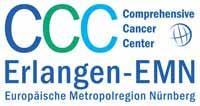

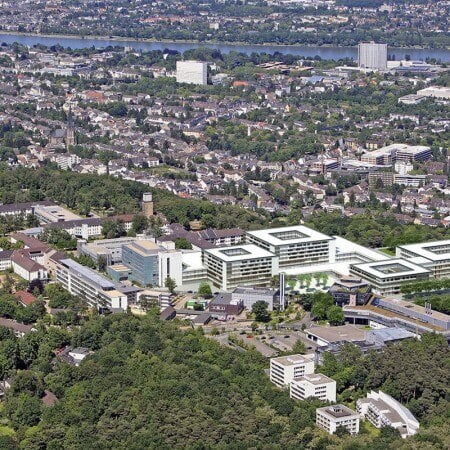






















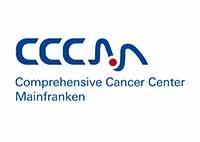






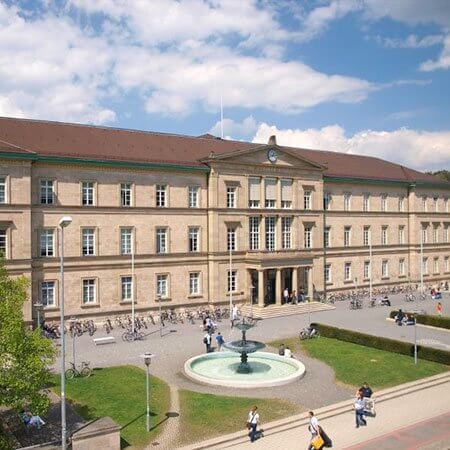












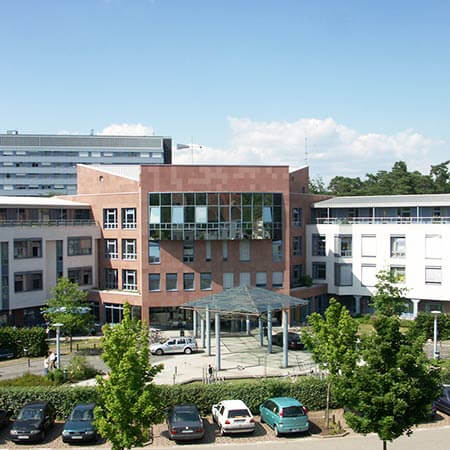



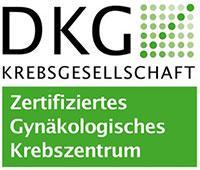


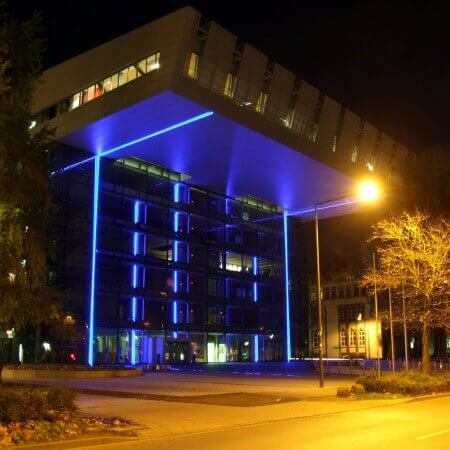






One in six patients have metastatic prostate cancer at the time of their diagnosis. This is the 4th stage of the disease, which is considered incurable. Nonetheless, modern therapies can control prostate cancer for many years to come. Doctors in Germany use hormone therapy, chemotherapy, targeted therapy, and immunotherapy for prostate cancer treatment. Some patients are considered suitable candidates for surgery and radiation therapy. Specialized hospitals use innovative, radionuclide treatment methods. Doctors make intravenous injections with a drug that accumulates in tumor foci and destroys them with radiation. As a result of radio-targeted therapy, the tumors decrease in size, and sometimes disappear completely.
Content
- Hormone therapy and chemotherapy
- Targeted therapy and immunotherapy
- Does the patient require radiation therapy or primary tumor removal?
- Lutetium radionuclide therapy
- Radium radionuclide therapy
- Why is it worth undergoing metastatic prostate cancer treatment in Germany?
Hormone therapy and chemotherapy
The most common treatment for metastatic prostate cancer is hormone therapy. It provides long-term control of the tumor and metastatic foci.
Preference is given to medical drugs – luteinizing hormone-releasing hormone (LHRH) antagonists. However, when treated with these drugs, the symptoms often become more severe, and only after a while do they weaken. Therefore, at the early stage of therapy, antiandrogens are used, since they work faster.
The second most common treatment for prostate cancer with metastases, is chemotherapy. It can be combined with hormone therapy. Some patients receive chemotherapy only after hormone treatment for prostate cancer has become ineffective.
Targeted therapy and immunotherapy
For targeted therapy for prostate cancer, PARP inhibitors are used. They are prescribed only to patients with BRCA gene mutations. The drugs block the ability of tumor cells to repair damaged DNA. These drugs are usually used when hormone therapy and chemotherapy are not effective enough.
Immunotherapy for prostate cancer is carried out with the following medications:
- sipuleucel-T prostate cancer vaccine;
- immune checkpoint inhibitors.
The cancer vaccine is made for each patient individually. Doctors take immune cells from their blood. These are then sent to a laboratory, where they are mixed with prostatic acid phosphatase (PAP). The white blood cells are then injected back into the body. Then, they are able to recognize and attack the tumor. The procedure is carried out once every 2 weeks. In total, the vaccine is administered 3 times. It does not cure cancer, but increases the life expectancy of patients by several months.
PD-1 inhibitors work by enhancing antitumor immunity. They block proteins that help the tumor evade the immune response. These drugs are used only for high levels of microsatellite instability (MSI-H), or changes in one of the mismatch repair (MMR) genes. Medicines are administered intravenously, once every 2-3 weeks.
Does the patient require radiation therapy or primary tumor removal?
Most patients with distant metastases will be treated with systemic methods alone.
The recent HORRAD study has shown improved survival with prostate irradiation. But, it is advisable in patients with only a small number of metastases.
It is likely that similar results will be achieved with the surgical prostate removal. But, so far, there are no studies that confirm this. Therefore, outside of clinical investigations, doctors use only radiation therapy.
Some hospitals practice metastasis-directed therapy. Metastatic foci are removed surgically or destroyed by radiation. This approach is used only in the presence of a small number of metastases (usually no more than three). More often, metastasis-directed therapy is received by patients in whom the primary tumor was successfully removed, but then the disease recurred in regional or distant metastases. The best results from treatment are achieved in patients with regional metastases in the lymph nodes. So far, metastasis-directed therapy is not considered a standard treatment for patients with advanced prostate cancer, but it is available within the framework of clinical investigations.
Lutetium radionuclide therapy
Countries with developed medicine use radionuclide therapy for the treatment of metastatic prostate cancer. Doctors inject a radiopharmaceutical that finds tumors, and destroys them with radiation.
How does this work? Cancer cells contain large amounts of PSMA (prostate-specific membrane antigen). It is a prostate-specific protein that is almost non-existent in other tissues. It is used as a target for radio-targeted therapy.
The radiopharmaceutical consists of two components:
- ligand – a molecule that can bind to PSMA, and therefore, it can accumulate only in cancer cells;
- radionuclide – a radioactive substance that destroys the tumor by radiation.
The most commonly used radionuclide is Lutetium, but other radioactive substances can also be used. Some medical hospitals also use Actinium.
The radiopharmaceutical is administered intravenously. It is carried in the blood throughout the body and is taken up by prostate cancer cells, regardless of where the tumor foci are located. Radionuclide therapy destroys not only the primary tumor, but also prostate cancer metastases, regardless of where they are located. Radiation destroys even undetected micrometastases, which cannot be determined by radiation methods due to their small size.
Although radioactive material accumulates in several parts of the body, the treatment is highly safe and well tolerated. This is due to the fact that the radiation spreads over a short distance. Therefore, only the tumor is damaged, but the healthy tissue around it hardly suffers from the radiation.
To undergo prostate cancer treatment with Lutetium, a person will be hospitalized. The patient will be examined with PSMA-PET scanning. The doctor injects a small dose of the radioactive substance to assess where the metastatic tumors are located. The patient is carefully examined to determine the size of all the tumors – this is necessary for the subsequent assessment of the response to radionuclide therapy. The patient also undergoes a general clinical examination to make sure that there are no contraindications to radionuclide therapy.
The course of treatment itself consists of one intravenous injection. Since the salivary glands and kidneys contain a small amount of PSMA, doctors take steps to protect these organs. The patients are given crystalloid solution injections and the salivary gland area is cooled to reduce blood flow, slow metabolism, and reduce radiopharmaceutical accumulation. As a result, only a small number of treated patients suffer side effects. The most common of these is a dry mouth.
During the next few days, the patient emits radiation. Therefore, they must spend this time in the hospital. They can usually return home on the fourth day.
Lutetium therapy is repeated every 8 weeks. Once in every 2 cycles, PSMA-PET scanning is carried out. In most patients, tumors shrink as a result of the treatment. For some patients, the tumors disappear completely. Lutetium allows long-term remission of the disease. Moreover, the treatment works even in the most severe cases: when the tumor has progressed even after hormone therapy and chemotherapy. Radionuclide treatment is better tolerated by patients than chemotherapy.
The cost of Lutetium-177 PSMA therapy for metastatic prostate cancer ranges from 22,700 EUR and 44,070 EUR.
Radium radionuclide therapy
Radioactive Radium is used for prostate cancer with bone metastases. It is not used in the presence of visceral metastases (tumor foci in the internal organs).
Radium is administered intravenously. It interacts with bone tissue hydroxyapatite. The drug accumulates in the bones, and destroys metastatic foci with radiation. At the same time, the radioactive substance does not accumulate in the other organs, so the risk of complications is low.
The radiation that radium gives off is more than 95% alpha radiation, which spreads over 0.1 mm. This means that it does not penetrate deep into the bone marrow and does not destroy it. Therefore, the risk of side effects on the part of the hematopoietic function is lower than when using other drugs for radionuclide therapy: for example, strontium or samarium.
Radium preparations are used in castration-resistant, metastatic prostate cancer. The indications for their use are as follows:
- three consecutive increases in PSA levels due to hormone therapy (the interval between tests is at least 7 days);
- two consecutive increases, if one of them is more than one and a half times (with the initial PSA levels of at least 2 ng/ml);
- the development of two additional bone metastases.
Radium preparations are suitable for most patients with metastatic cancer who do not respond to other treatments, as 90% of them have bone metastases.
The drug is well tolerated. 25% of patients have no side effects at all, 65% develop 1-2 grade toxic reactions which do not require hospitalization and the interruption of the course of treatment. Only 10% of those treated develop grade 3 or higher side effects. The cost of Radium-223 dichloride (Xofigo®) therapy for prostate cancer with bone metastases ranges from 21,700 EUR and 23,600 EUR.
Why is it worth undergoing metastatic prostate cancer treatment in Germany?
Germany is a country with advanced medicine. Germany uses innovative methods of prostate cancer treatment that are not yet used in other states. As a rule, the standard treatment is hormone therapy and chemotherapy, and, if this does not work, doctors opt for symptomatic treatment. However, in Germany they use many other ways to fight cancer. Therefore, even patients with advanced prostate cancer can live for many more years if they receive medical care in one of the German hospitals.
There are a few reasons for you to undergo prostate cancer treatment in Germany:
- the use of innovative drugs: cancer vaccines, immunotherapy with checkpoint inhibitors, targeted therapy;
- the use of modern methods of prostate irradiation to suppress the primary tumor, with a minimal risk of side effects;
- advanced hospitals use metastasis-directed therapy: metastases are removed surgically or destroyed by radiation;
- the use of radionuclide treatment methods, which can increase life expectancy by several years, and in some cases, lead to the complete removal of the tumor and metastases of prostate cancer;
- high-quality accompanying treatment, reducing the risk of complications and side effects.
To undergo metastatic prostate cancer treatment in Germany, please use the Booking Health service. On our website you have the opportunity to get up-to-date and accurate information about the cost of treatment in Germany, compare prices in different German hospitals and book a medical care program at a favorable price. The treatment will be easier and quicker for you, and the cost of treatment in Germany will be lower.
You are welcome to leave your request on the Booking Health website. Our employee will contact you, consult with you, and answer all of your questions. We will take care of the organization of your trip abroad. We will provide the following benefits for you:
- We will select the best German hospital, whose doctors specialize in the treatment of metastatic prostate and achieve the best results.
- We will help you to overcome the language barrier and establish your communication with the doctor at the German hospital.
- The waiting period for your diagnostics and treatment will be reduced, and you will receive medical care on the most suitable dates for you.
- We will reduce the price. The cost of treatment in Germany will be lower than usual due to the elimination of overpricing and coefficients for foreign patients.
- Our experts will solve any organizational issues: paperwork, transfers from the airport to the German hospital and back, hotel booking, and interpreting services.
- We will prepare your documents and translate them into English or German. You do not have to repeat any previously performed diagnostic procedures.
- We will stay in contact with the German hospital after the completion of your treatment.
- We will arrange additional diagnostics and treatment, if required.
- We will buy medicines in the other country and forward them to your native country.
While the best specialists in the world are taking care of your health, the Booking Health staff will help reduce the cost of treatment in Germany and take care of all the travel arrangements.
Authors:
The article was edited by medical experts, board certified doctors Dr. Nadezhda Ivanisova and Dr. Sergey Pashchenko. For the treatment of the conditions referred to in the article, you must consult a doctor; the information in the article is not intended for self-medication!
Our editorial policy, which details our commitment to accuracy and transparency, is available here. Click this link to review our policies.
Sources:
National Center for Biotechnology